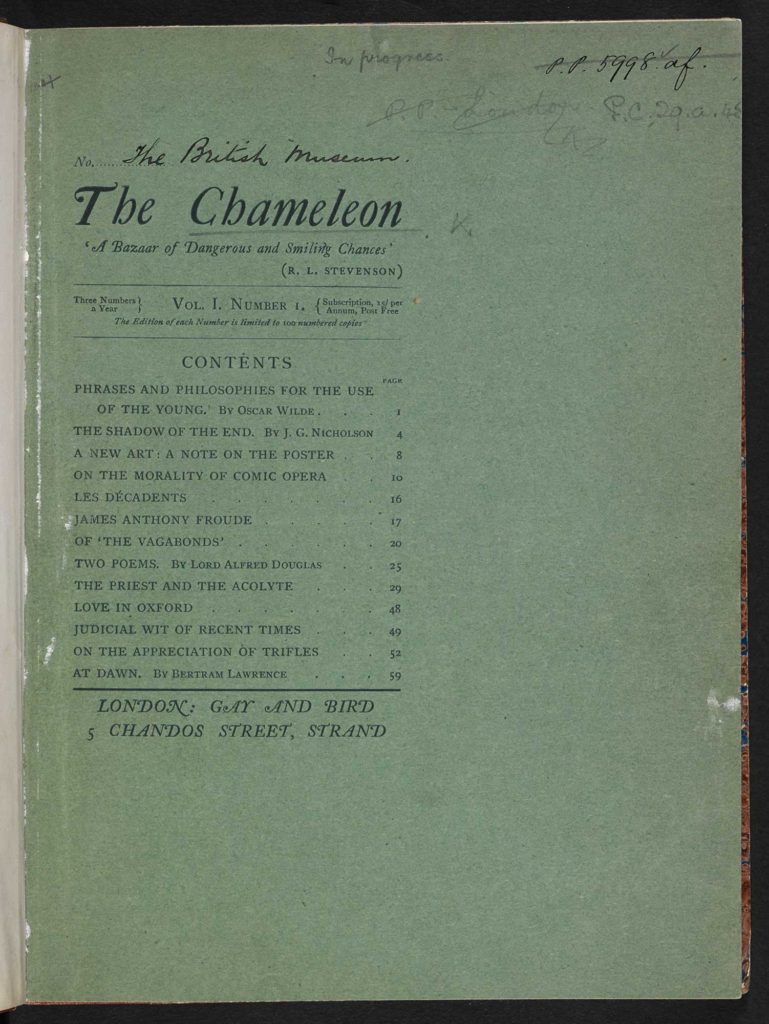Today’s theme song in ENGL 203-04 is “The Untraditional,” by Chumbawamba, from their album A Singsong and a Scrap, released in 2006. Lyrics here.
The third stanza of “The Untraditional” characterizes the love between the poem’s “two men” as a “love that dare not speak its name.” The phrase is borrowed from a poem by Lord Alfred Douglas that first appeared in The Chameleon (1894) titled “Two Loves”.

In Douglas’ poem, the speaker sees a vision of two youths, each of which claims the name “Love.” One stands for the love that fills the “hearts of boy and girl with mutual flame” — that is, heterosexual love. Of the other, who represents same-sex love, the first says,
‘He lieth, for his name is Shame,
But I am Love, and I was wont to be
Alone in this fair garden, till he came
Unasked by night …’
The closing lines of “The Untraditional,” picking up Douglas once again, forecast a future in which same-sex love will no longer be identified as shameful: “And in some far off place I know/That our love may shameless be.”
As we begin our conversation about Oscar Wilde’s The Importance of Being Earnest (1895), we need to keep in mind Wilde’s relationship — both personal and literary — with Douglas.
In that same issue of The Chameleon, alongside “Two Loves” and another Douglas poem — “In Praise of Shame” — there appeared a collection of epigrams by Wilde titled “Phrases and Philosophies for the Use of the Young.” One of these epigrams reads, “If one tells the truth one is sure, sooner or later, to be found out.” In Earnest, Jack will say, “Gwendolen, it is a terrible thing for a man to find out suddenly that all his life he has been speaking nothing but the truth.”
Many of the other epigrams resonate with the themes and situations of Earnest, perhaps none more than this: “The first duty in life is to be as artificial as possible. What the second duty is no one has as yet discovered.”
Earnest premiered at the St. James Theater on February 14, 1895. Lord Douglas’ father, the Marquess of Queensbury, convinced (correctly) that Wilde and Douglas were in a relationship, planned to disrupt the performance, but he was foiled by Wilde, who had arranged for police to surround the theater.
Determined to bring down Wilde, Queensbury would ultimately prevail. Through a complicated chain of events that you can read about here, Wilde would ultimately be sentenced — in the third of three trials — for violating a relatively new statute, the Criminal Law Amendment Act (1885), which outlawed “acts of gross indecency.” In the trials, Wilde was questioned not just about his actions but about his writings, including “Phrases and Philosophies.” He was also questioned about Douglas’ poems. Asked whether he thought the lines about love and shame in “Two Loves” made “any improper suggestion,” he replied, “No, none whatever.”
For a full account, see Merlin Holland, The Real Trial of Oscar Wilde: The First Uncensored Transcript of The Trial of Oscar Wilde vs. John Douglas (The Marquess of Queensbury), 1895 (HarperCollins, 2003).
